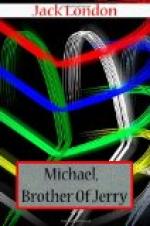It was because he knew the game and had learned it from his father before him, a man even smaller than himself and more fearful of all things except animals. This father, Noel Collins, had been a successful animal trainer in England, before emigrating to America, and in America he had continued the success and laid the foundation of the big animal training school at Cedarwild, which his son had developed and built up after him. So well had Harris Collins built on his father’s foundation that the place was considered a model of sanitation and kindness. It entertained many visitors, who invariably went away with their souls filled with ecstasy over the atmosphere of sweetness and light that pervaded the place. Never, however, were they permitted to see the actual training. On occasion, performances were given them by the finished products which verified all their other delightful and charming conclusions about the school. But had they seen the training of raw novices, it would have been a different story. It might even have been a riot. As it was, the place was a zoo, and free at that; for, in addition to the animals he owned and trained and bought and sold, a large portion of the business was devoted to boarding trained animals and troupes of animals for owners who were out of engagements, or for estates of such owners which were in process of settlement. From mice and rats to camels and elephants, and even, on occasion, to a rhinoceros or a pair of hippopotamuses, he could supply any animal on demand.
When the Circling Brothers’ big three-ring show on a hard winter went into the hands of the receivers, he boarded the menagerie and the horses and in three months turned a profit of fifteen thousand dollars. More—he mortgaged all he possessed against the day of the auction, bought in the trained horses and ponies, the giraffe herd and the performing elephants, and, in six months more was quit of an of them, save the pony Repeater who turned air-springs, at another profit of fifteen thousand dollars. As for Repeater, he sold the pony several months later for a sheer profit of two thousand. While this bankruptcy of the Circling Brothers had been the greatest financial achievement of Harris Collin’s life, nevertheless he enjoyed no mean permanent income from his plant, and, in addition, split fees with the owners of his board animals when he sent them to the winter Hippodrome shows, and, more often than not, failed to split any fee at all when he rented the animals to moving-picture companies.
Animal men, the country over, acknowledged him to be, not only the richest in the business, but the king of trainers and the grittiest man who ever went into a cage. And those who from the inside had seen him work were agreed that he had no soul. Yet his wife and children, and those in his small social circle, thought otherwise. They, never seeing him at work, were convinced that no softer-hearted, more sentimental man had ever been born. His




